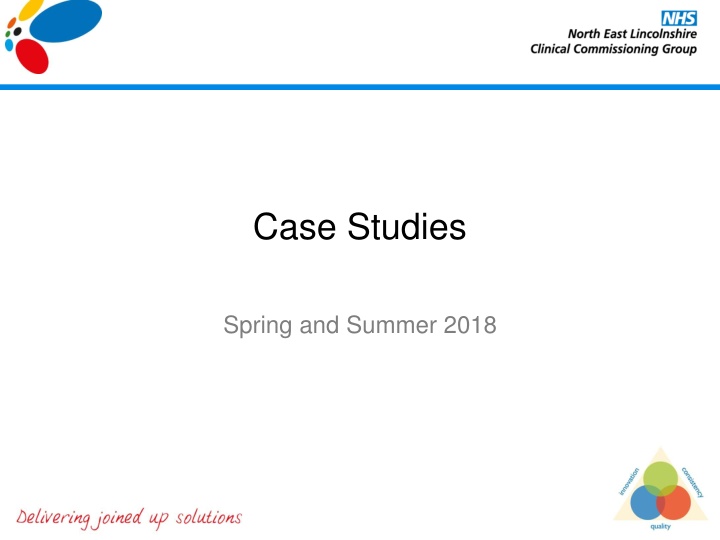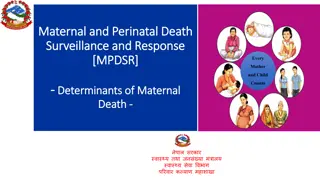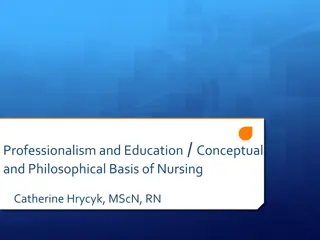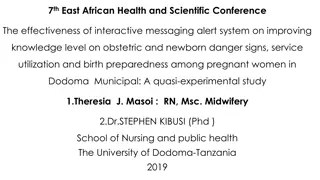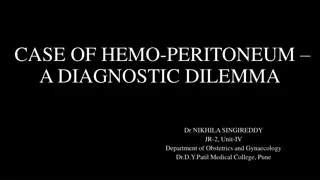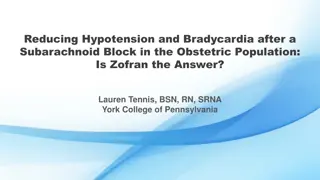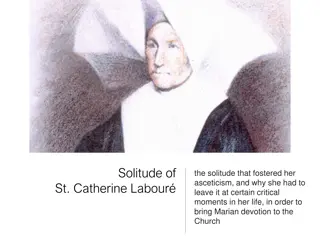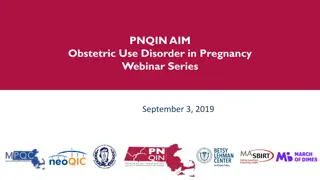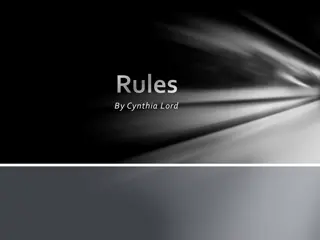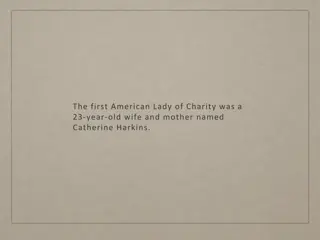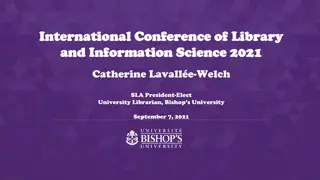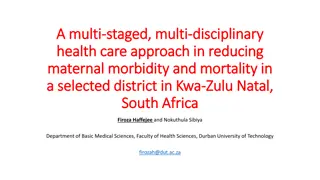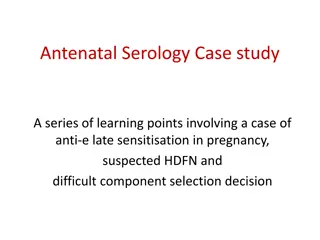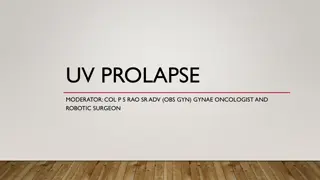Complex Obstetric Case Study: Catherine's Challenging Journey
24-year-old Catherine, diagnosed with autism and a learning disability, faces a complex obstetric situation. With little understanding of childbirth and a strong aversion to medical interventions, Catherine's refusal of necessary treatments raises ethical and legal dilemmas for healthcare providers. The case prompts considerations of decision-making authority, best interests, human rights, and non-medical factors influencing the care of pregnant individuals with disabilities.
Download Presentation

Please find below an Image/Link to download the presentation.
The content on the website is provided AS IS for your information and personal use only. It may not be sold, licensed, or shared on other websites without obtaining consent from the author.If you encounter any issues during the download, it is possible that the publisher has removed the file from their server.
You are allowed to download the files provided on this website for personal or commercial use, subject to the condition that they are used lawfully. All files are the property of their respective owners.
The content on the website is provided AS IS for your information and personal use only. It may not be sold, licensed, or shared on other websites without obtaining consent from the author.
E N D
Presentation Transcript
Case Studies Spring and Summer 2018
Case Study: Catherine (1) Catherine is a 24-year-old woman with a diagnosis of autism and learning disability Catherine was born in Nigeria, but has lived in the UK with her parents for around 10 years Around 2 years ago, Catherine moved to a supported living placement; she receives 20 hours of support weekly In Nigeria, Catherine may have undergone 2 forced episodes of cutting: 1, to release bad blood from her abdomen when unwell, and 2, FGM (the extent of which is unknown) When Catherine visits her parents, they suspect she is pregnant; they take her to the GP who confirms a pregnancy of around 30 weeks gestation The father/ circumstances of conception are unknown
Case Study: Catherine (2) Catherine is referred to the local hospital and assigned to the care of consultant obstetrician, Mr Green, and his team Mr Green and his team report that Catherine is largely uncooperative; she refuses to provide blood samples, or undergo most examinations. Catherine does allow ultrasound scans, from which staff glean some information about the baby, and revised estimated date of delivery; she also allows staff to examine her abdomen, listen to baby s heartbeat, and test her blood pressure Catherine demonstrates little, if any, understanding of childbirth but says she wants to have her baby at home, by herself: she is averse to needles and machinery, and mistrusts staff In the weeks leading up to Catherine s delivery date she becomes more unsettled. Mr Green and his team are concerned and want to admit Catherine to hospital Mr Green and team believe Catherine needs a caesarean section, if necessary using force in a way that deprives her of liberty Catherine objects to a Caesarean and refuses admission
Case Study: Catherine (3) 1. Where should the hospital start in considering their approach to Catherine? 2. Catherine has no decision makers appointed to act for her (no attorney or deputy); who is the decision maker in this case? Does the decision maker require any external authority before proceeding with obstetric treatment? 3. When considering what approach may be in Catherine s best interests, what should be taken into account? 4. Which rights under the European Convention on Human Rights are engaged in this matter? 5. What other non-medical matters might have to be considered outside of Catherine s labour?
Case Study: Catherine (4) Re CA: Natural Delivery or Caesarean Section [2016] EWCOP 51 http://www.bailii.org/ew/cases/EWCOP/2016/51.html NHS Trust 1 v G Practice Note [2014] EWCOP 30 http://www.bailii.org/ew/cases/EWCOP/2014/30.html
Outside of obstetrics. ..in terms of more run of the mill procedures that might be refused by a potentially incapacitous individual, what approach would you take?
Case Study: Mildred (1) Mildred has dementia. She lives at home with her husband, George In the past, Mildred received Council arranged domiciliary care; George felt this was unreliable so he cancelled it George then became Mildred s principal carer Mildred lost capacity to decide about her care needs. The Council s records show she has no insight into her needs and wants to live with her parents, both of whom died years ago Mildred is admitted to hospital with a chest infection. While Mildred is in hospital, concerns are raised about George s ability to meet all his wife s needs George is not Mildred s attorney but he uses her money to meet her expenses whilst in hospital, and to reimburse himself for expenses he has met on Mildred s behalf A best interests meeting is convened to decide where Mildred s needs should be met post-discharge; hospital and social care staff, an IMCA and George all attend
Case Study: Mildred (2) Mildred needs help with personal hygiene (washing, dressing and continence), eating, drinking, and medication; her needs are increasing due to her degenerative condition George has some concern about meeting Mildred s personal hygiene needs, but feels he can do everything else; staff are very concerned about hygiene, continence and pressure sores Attendees discuss whether Mildred could return home with a care package of 4 calls per day (with a different care agency from the one George previously discharged); George will only accept 1 call a day The consensus of the meeting was that Mildred s needs would be best met in 24 hour residential care; only George disagrees The Council arranges Mildred s placement in a nursing home Mildred appears stable in her new home to begin with, but then becomes agitated. Her GP prescribes sedatives
Case Study: Mildred (3) 1. Mildred s lack of capacity to make care/ accommodation decisions is accepted; as Mildred can t decide, who can decide for her? 2. In the context of a best interests decision, what is the significance of George s disagreement? 3. Are there any other considerations arising from Mildred s care in a nursing home? 4. What about George s needs? 5. Which rights under the European Convention on Human Rights are engaged in this matter? 6. Are there any issues arising from George's use of Mildred s money ?
Case Study: Mildred (4) https://www.lgo.org.uk/decisions/adult-care- services/domiciliary-care/16-009-384
Case Study 3: Reg (1) Reg has a terminal medical condition; he lives in a care home due to the effects of the condition on his health and wellbeing Reg has two daughters, Elizabeth and Joan, who visit him regularly; they don t get on with each other Reg made allegations of abuse against Joan to staff at the care home, and by phone to Elizabeth. Reg s allegations included that Joan as his attorney - is spending his money inappropriately Elizabeth passes the allegations made by her father to the care home, and says she has witnessed Joan manhandling and verbally abusing Reg The care home raises the allegations with the local safeguarding team; they are concerned about the potential for financial, emotional and physical abuse although their staff haven t witnessed any abuse; they tell the team that Reg has recently had periods of confusion The safeguarding team begin an enquiry; team member Sam attends the home to meet with its manager, and with Reg, and Joan. Sam interviews Reg alone, and together with Joan
Case Study 3: Reg (2) Sam notes that Reg: had variable capacity and confusion was unable to protect himself from abuse due to his poor prognosis and memory loss could not rationalise information Sam notes that Reg seemed happy to discuss the issues, both with and without Joan in the room. Sam records that Reg says he trusts Joan and doesn t want to change her acting as his attorney Joan shows Sam a bank statement in Reg s name that shows a healthy and consistent balance The manager of the home says she is not overly concerned about Joan s behaviour or the relationship dynamic Sam doesn't speak to Elizabeth Sam concludes that no harm has been experienced, and makes no further enquiries Reg dies a few months later
Case Study 3: Reg (3) The ombudsman in this case decided that the Council was at fault in the way it handled its investigation of Reg s safeguarding matter List as many ways as you can think of in which the Council (via Sam) has been at fault
Case Study: Reg (4) https://www.lgo.org.uk/decisions/adult-care- services/safeguarding/17-002-144 Report a safeguarding concern: 01472 256256 Report concerns about an attorney (or deputy): https://www.gov.uk/report-concern-about-attorney- deputy
Case Study 4: Bob (1) Bob lives in a retirement housing block which caters for those with moderate disabilities; he has a private room and there are shared facilities. The Council pays for his accommodation Bob has mobility issues and a speech disability and usually attends a day care centre during the day. He had a tendency to hoard things in his room, particularly clothing The Council has never assessed Bob s mental capacity, but accepts the views of those who know him that he has capacity to make decisions The manager of the housing block finds that Bob s room is infested with bed bugs. The manager of the day centre refuses Bob further access until his room is decontaminated Bob s social worker arranges for his room to be cleaned and for Bob to stay in a hotel during cleaning Bob s room has to be emptied to allow decontamination; the cleaners bag rubbish for disposal and clothes for washing Someone contacts Bob s daughter and she gives authority for badly contaminated clothes to be disposed of On return from the hotel, Bob finds almost all his possessions have been disposed of, except his curtains Bob complains to the Council that his possessions have been stolen
Case Study 4: Bob (2) Is there any information in this case study which might indicate that the presumption of capacity should be dislodged? How helpful is it to know that those who know Bob consider him to have capacity to make decisions? What is the role of Bob s daughter in decision making? The Ombudsman held that: while it was certainly permissible for the Council to clean all of [Bob s] possessions in the interests of public health, it was not permissible for them to destroy them against his wishes and without his permission; what do you think the Council should have done? What do you think the Ombudsman ordered the Council to provide, to compensate Bob for his losses?
Case Study: Bob (3) https://www.lgo.org.uk/decisions/adult-care- services/other/17-005-183
